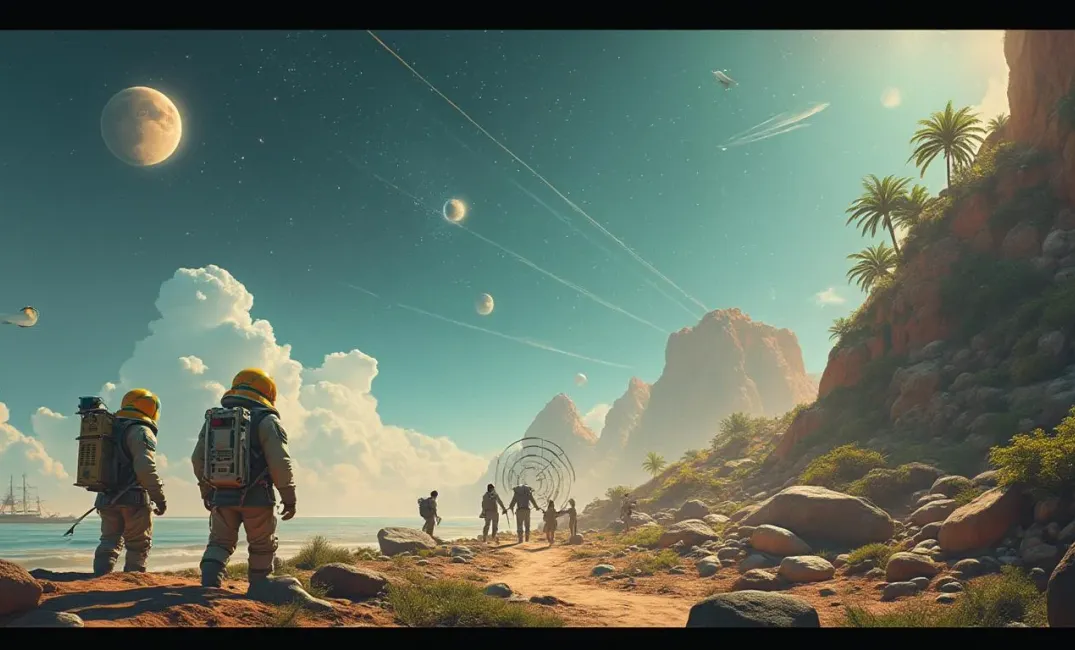Introduction: Humanity's Journey into the Unknown
"Exploration is really the essence of the human spirit." — Frank Borman
Throughout history, the spirit of exploration has defined humanity. Driven by curiosity, necessity, and ambition, humans have perpetually sought to push the boundaries of their known world—whether expanding territory, enhancing knowledge, or seeking new endeavors that provide comfort or promise. This chronicle follows humanity's indomitable journey into the unknown, highlighting transformative exploration undertakings that reshaped civilizations and continue to guide our aspirations.
Ancient Expansions: The Dawn of Discoveries
Early Expeditions and Trade Routes
- Hunter-Gatherer Migrations: Tracing the footsteps of early humans like Homo erectus and Homo sapiens who migrated across continents in search of sustainable habitats, setting the cornerstone of human settlement and cultural evolution.
- Silk Road: Centuries later, overland trade routes such as the Silk Road became corridors of communication, making the exchange of goods, ideas, and cultures possible between Asia and Europe.
Maritime Discoveries
- Phoenician Navigation: Among the first to master the sea, the Phoenicians were heralded for their advanced navigation, allowing them to establish trade colonies and cultural exchanges across the Mediterranean.
- Viking Voyages: Viking expeditions marked an era where Norse exploration and raiding expanded influence across Northern Europe, leaving indelible cultural and genetic legacies.
The Age of Exploration: Transcending Continents
Discovering New Worlds
- The Columbian Exchange: Christopher Columbus's 1492 voyage to the Americas initiated the Columbian Exchange, a global diffusion of crops, animals, ideas, technology, and peoples, catalyzing trade networks and facilitating both prosperity and cultural upheaval.
- Magellan's Circumnavigation: Completing the first circumnavigation of the Earth, Ferdinand Magellan's expedition united global communities, revealing interconnectedness and inspiring further exploration.
Colonial Expansion and Its Consequences
- Impactful Colonial Powers: European colonial powers like Spain, England, France, and Portugal expanded territorial claims across Africa, Asia, and the Americas, often at the cost of indigenous civilizations and cultures.
- Cultural Interactions and Disruptions: Colonial expansion led to significant culture exchanges but also tragic disruptions seen through colonization's effects: ecological changes, loss of native lands, and the transatlantic slave trade.
Scientific Exploration: Unveiling Natural Wonders
Geological and Environmental Exploration
- Natural History Expeditions: Explorers like Charles Darwin embarked on voyages that explored the Earth's diverse ecosystems, providing empirical foundations for new scientific frameworks, such as evolution.
- Earth's Extremes: Geographic polar explorations pioneered by figures like Ernest Shackleton demonstrated human resilience against elemental challenges and expanded understanding of Earth's harsh environments.
Biological Breakthroughs
- Voyaging for the Living World: Expeditions in the 18th and 19th centuries delved into categorizing Earth's flora and fauna, identifying species and scientific phenomena that enhanced biodiversity comprehension.
- Legacy of Conservation: Scientific exploration led to growing awareness of the importance of preserving natural habitats, laying groundwork for future environmental conservation efforts as habitats declined.
Space Exploration: Expanding the Horizon
The Dawn of the Space Age
- Sputnik and the Space Race: Launched by the Soviet Union, Sputnik 1 marked the dawn of a new era, triggering a socio-political space race that drove ambitious projects and technological revolutions.
- Moon Landing Fever: Celebrated as a pinnacle of human endeavor, the Apollo 11 mission exemplified courage and collaboration, imprinting humanity onto a new celestial body—the Moon.
Exploring the Cosmos
- Mars and Beyond: From Mars rover missions to the distant Voyager probes, space exploration expanded knowledge about the solar system and beyond, probing enigmas of the universe from planetary compositions to cosmic phenomena.
- International Cooperation in Space: The International Space Station (ISS) represents unified exploration efforts, with astronauts from diverse nations contributing to scientific advancement and readiness for deeper cosmic exploration.
Innovative Frontiers: Virtual and Quantum Realms
Technological Advances and Exploration
- Digital Domains: As humanity approaches the digital frontier, virtual and augmented realities reshape exploration paradigms, connecting individuals to simulated environments and distant places.
- Quantum Discoveries: Cutting-edge quantum research reveals alternate aspects of exploration, promising revolutionary computation capability with implications across scientific fields from cryptography to teleportation phenomena.
Societal Interconnections
- Cultural Renaissance and Diversity: In the intersection of virtual innovations, diverse cultural and artistic expressions emerge, redefining today's interconnected world with rich, collaborative narratives shaping societies and identities.
- The Ethics of Exploration: Ethical dilemmas challenge explorative pursuits, questioning humanity's responsibility and impact on ecosystems, societies, and the execution of technological advancements.
The Future of Exploration: Reaching New Milestones
Cosmic Citizenship
- Colonizing New Worlds: As interstellar ambitions rise, discussions advance toward establishing human settlements on Mars, lunar bases, and beyond, examining both technological readiness and ethical implications.
- Finding New Frontiers: The relentless pursuit of knowledge widens the search for extraterrestrial life and new homelands, necessitating alliances across Earth-bound cultural, scientific, and resource sectors.
Innovation and Responsibility
- Collective Responsibility: Emphasizing ethical exploration ensures environmental sustainability, honoring cultural legacies, and the welfare of fellow people and species.
- The Role of Collaboration: Future endeavors will rely on multinational cooperation, joint missions, combined resources, and collective intelligence to navigate the demands and perceptivities of cosmic exploration.
Conclusion: Humanity's Eternal Quest
"To boldly go where no one has gone before." — Star Trek
Human exploration is the relentless expression of our collective imagination and curiosity. Traversing terrestrial boundaries to cosmic depths, the pursuit of discovery both recognizes humanity's triumphs and illuminates its potential to adapt and thrive against unimaginable odds. As the journey continues, embracing ethical principles, collaboration, and innovative thinking will unlock doors to sustainable futures and affirm exploration's timeless role in defining human existence across evolving frontiers.
The odyssey of exploration reflects the spirit that propels humanity ever forward—adventurous, resilient, and unyieldingly inquisitive. By supporting human efforts to grasp the unknown, exploring with intention, and aspiring beyond beyond—whether through cultural frontiers, scientific revolutions, or new celestial horizons—endless possibilities await on the untraveled path.
CULTURE, HISTORY, SCIENCE, FUTURE, INNOVATION, DISCOVERY, EXPLORATION, HUMANITY, SPACE

